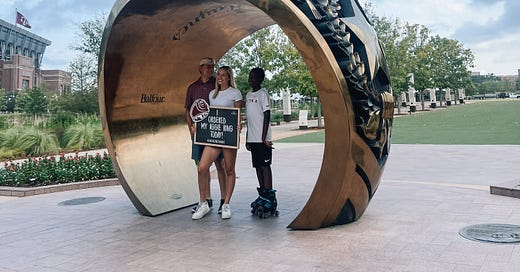I know it's hard to put yourself in the shoes of somebody whose struggles are different from yours, but I hope this article gives you a quick glance at what it's like as an autism mama.
If you spend time with a neurodivergent kid in public, then you must be familiar with these thoughts:
“How is he/she going to act?”
“Is he going to run away?”
“Will she say strange things to people?”
“Will he try to touch people?”
“Is he going to try to run in front of a car?”
“Is she going to push the boundaries?”
“Is he going to blatantly disobey?”
“Will she get mad & storm off?”
“Am I going to have to remove him from the situation?”
Another level deep beyond those questions are these:
“Am I going to be embarrassed?”
“Are people going to stare at us?”
“Will I feel completely misunderstood & judged?”
“Will I feel like a ‘bad mom‘?”
These are the thoughts that have gone through my head pretty much every single time we've left the house over the past decade. It's the unknown that is often so challenging as a parent of an autistic kid. Sometimes my fears are realized, and other times I have been totally wrong, and we have had a great time. I never know what type of mood my son will be in, what will trigger or upset him, or when he will just be "done”.
So, add all of that on top of the looks, stares, and comments from strangers-- and it's all of that times ten.
Let me pause and answer the question you might be asking: “Isn't this the same as worrying about your neurotypical kids?”
No. No, it's not. Have I felt embarrassed or worried by “the girls” (my other three daughters, who are neurotypical) at times? Yes.
Have they thrown tantrums at the store? Absolutely, yes.
But past a certain age, this is not a worry of mine in public. They know how to act, behave, and handle themselves in public. Another topic for another day is the kid who holds it together SO well at school, church, with friends & family, and then lets it all go at home (I have one of those, too).
But back to Camp. Now that he's almost 13, being out in public looks really different than it did when he was 3-4 years old. First off, autism is an "invisible disability," which means he doesn't "look" like he has special needs.
Secondly, people aren't saying things to me like "he's just a toddler" or "he's just being a boy." Nope, we are past that.
Thirdly, he's entirely too big/heavy for me to do what I used to do when he had a tantrum, which was to throw him over my shoulder and physically carry him out of the situation.
So when he verbally stims, tries to touch strangers, throws himself on the ground, etc., I have one of three potential choices to make:
Option One: Do I wait and just let it play out, hoping that nothing happens, and we can escape unscathed?
Option Two: Do I tell the onlookers that he's on the spectrum, hoping that there will be a level of awareness that extends (and if I'm honest, me) some grace his way?
Option Three: Do I intentionally not tell them?
We've encountered some of all these situations over the past few months that I will share for some context. I'll start with the hardest option, in which I did not share with the individuals involved that he is on the spectrum. I've done this with people in public who are rude, lacking empathy, kindness, or curiosity. In these situations, I have chosen to take him and leave.
Recently, while at a children’s museum, Camp was flicking the lights on and off, something he does often—an example of his stimming. A museum employee sternly told him repeatedly to stop, so we left.
Or at the homeschool open house, someone came up to us with a very rude tone and told me--not him--that he crumpled some paper on her table and that “I needed to make sure he didn’t mess with everyone else’s stuff”.
A little kindness would have gone a long way in both of those quick interactions, but again, he doesn’t “look” like he has any kind of special need and he’s almost 13. So adults just assume he should be able to keep his hands to himself.
Option Two we have while we are in public is to give a quick verbal cue and rundown of what behaviors he might have, which tends to give some context for why! : "He's on the spectrum, so if he...
starts talking and asking questions, quoting movies or tv shows, or uses inappropriate language…”
This past summer we encountered multiple family groups at our beach condo whom we would be seeing every day for a week, and this worked extremely well! We were met with such empathy, kindness, and love. What we didn’t expect was for multiple of the families to have the same struggles with someone they love! It was such a gift and made me so grateful we shared.
That brings me to Option One (and the most ideal) & today we experienced the perfect example of what I wish all of our encounters were like.
I took the kids to Aggie Park, a big open space/pond on our university’s campus, for “fun Friday". Right when we got there, there was a cute, young college couple taking photos at the life-size Aggie ring (It's an Aggie tradition when you get so many hours as a student. Their mom was taking their picture (again, tradition,) and there was my sweet Camp, totally oblivious and on his roller skates right in the frame of their photo.
I kindly pointed out to Camp that they were taking a photo, and he was in the background. I asked him to move over a few feet so that he wasn't in it.
He didn't want to move. Total non-compliance. I asked again a few different ways, very calmly and encouragingly, but he wasn't having it.
Let me point out that at this point in the past, I would have gone over and physically removed him from that situation. We would have caused a scene, but now that he's almost 100 pounds it’s more challenging to physically remove him.
This is the tension: I don't want to be a bother or inconvenience for others.
Another quick note to show the difference: My girls (after a certain young age) instinctively know not to get in the picture of strangers. Or at the very least, when I ask them to move, they can understand why. Camp’s brain just works differently! That’s not something he would even consider, which is why he did not move from the photo being taken when I asked him kindly to.
I chose to go with Option Three in my response and just let it play out. I'M SO GLAD I DID. Honestly, I wanted to tell them they restored my hope in humanity, but I didn't want to be too dramatic. 🙃🙃
This is what happened.
He was still standing there, and I heard the mom say to Camp, "Do you want to get in the picture with them first, and then I can take one of just them?"
He said YES. I truly wish I had a video of what happened next, but the memory of it is seared in my mind. The young college guy walked down the steps to hold Camp’s hand and help him walk the four to five small steps to where they were taking the photo. Mind you, he was on roller skates! The guy even encouraged Camp, "Man, this is hard! You are doing a great job!”
Camp posed with them (and actually smiled! That's a feat!), and then he was 100% content, so we moved on.
This is seriously such a huge win for both me and Camp. It showed me that he just wanted to be included, and he was! It reminded me that people are kind and that kids like Camp aren't a "bother.” I keep wondering if this quick interaction will stay with this group as much as it will me. I believe in my heart that Camp actually blessed THEM this morning as much as they blessed us.
THAT is how I want to believe & how I want to operate in the world! I don't want to see people who are "different" as me as a nuisance or bother but as a fellow child of God. I want to remember that there are other people out there who wish for the same.
I also want to remember that there are still so many in our world who have never been exposed to or loved someone with neurological differences, and that is uncomfortable. That's ok! But I know we can know more and be better.
✿Next time you are out in the world and you see a family that might seem a little "different,” start small. Use kind eyes. Kindness goes a long way. ✿
“You forget many things in life, but you never forget kindness” – White Bird Movie









Share this post